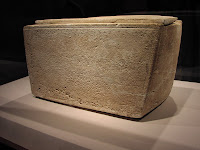
Dr. Borg's lecture on ECU's campus last night was titled, "Christians in an Age of Empire: Then and Now."
Overall, I wasn't really impressed by the lecture. Dr. Borg talked a lot about the Anti-Empire themes in the Bible in really general ways, but gave very few examples of any Anti-Empire rhetoric. He even stated, "God's passion in the Bible is anti-empire." Really? It's not salvation history? It's not God reaching out to men who are distanced from Him? God's passion is anti-empire?
Borg defined Empires with 4 criteria:
1)Ruled by the few
2) Elites used the system to exploit
3)Violence towards the lower classes
4)Legitimated by religion
I agree that number 1 is generally a criteria of empire simply because anarchies make very poor empires. Number 2 is not necessarily part of an empire, though it can be. Same with number 3. Number 4 is puzzling - did Stalin use religion to legitimate his empire? I'm not saying it never happens, I'm saying that it's odd to use as a set criteria.
Borg discussed the OT Prophets and how they were critical of particular regimes, but never gave any evidence of an overall anti-Empire ideology. When discussing the NT, he talked about Augustus Caesar and some of his titles - "Son of God", "Lord", and "Savior of the World" (though he admitted this last one wasn't religious). Borg claimed that the Gospel writers were well aware of these titles and what political message they were sending by calling Jesus this, however, he didn't once mention that they have OT parallels. He didn't talk about typology at all. He left the dots unconnected and allowed the crowd to think, "Oh, well, that's where they got those names." I felt like I was watching Zeitgeist.
Borg also said that the birth stories in Matthew and Luke were anti-Empire. Establishing Davidic lineage was not showing that God's promises of an everlasting Kingdom were being fulfilled. Instead, this was a critique of the Roman empire. Everyone makes mistakes (I make more than my fair share), but Borg mistakenly put the Shepherds of Luke into Matthew's story and then discussed how this ties in with Matthew's overall theme in the birth story.
He focused on the new paradigm of the Kingdom of God. This was not a Kingdom of authority (!), but something that looks a lot like communes. He focused on the dailiness of the bread in Matthew 6, disregrading the "supersubstantiality" of it.
Overall, I felt like Borg's main point was completely unsupported. I don't see the anti-Empire, anti-authoritarian message that Borg does. I had a question for him, but someone jumped in front of me when I sat down next to the mic (to allow the little old ladies behind me to see Dr. Borg - aren't I a sweetheart?) and it was the last one. The question I wanted to ask was, "If one of the primary messages of the Bible, and specifically the NT, is anti-Empire, why do the Gospels show Jesus focused on the religious authorities rather than the Romans?"





